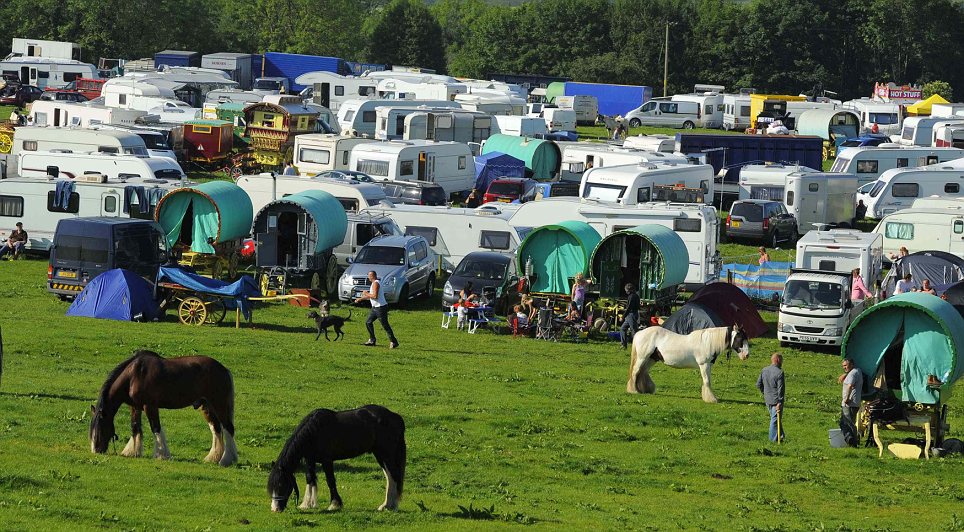The situation for Scotland’s Gypsy Travellers has “gone backwards” with people suffering “appalling discrimination”, a health crisis and high levels of poverty and unemployment, according to human rights campaigners.
The Scottish Government’s failure to implement a national strategy has also been condemned amid calls for urgent action by ministers to try to prevent the further marginalisation of Travellers.
The comments by political parties and NGOs followed a report last week by The Ferret featuring interviews with Scottish Travellers who spoke about some of the problems they faced.
Issues raised by the community included a shortage of official sites, problems accessing healthcare, police stop and search policy and racism.
In response, the Equality and Human Rights Commission (EHRC) echoed these concerns and said Scotland “desperately needs a national approach” while calling on the Scottish Government to show “leadership” on the issue.
The government is at “war with our lifestyle”, claim Scotland’s Travellers
Chris Oswald, EHRC head of policy in Scotland, said that the Scottish Government was supposed to publish a national Gypsy Traveller strategy in 2015 but failed to do so “without explanation”.
He claimed that the situation for Scottish Gypsy Travellers has since “gone backwards” with more sites closed than having been built, adding there is a “health crisis” in the community.
Oswald continued: “Negative attitudes about the community define their relations with settled people. Poverty, high unemployment, low skills, and poor educational attainment continue to blight the community.”
He added: “What is needed is leadership from the Scottish Government. Crucially unless the Scottish Government intervenes we will continue to see the erosion of Gypsy Travellers’ right to somewhere to live.
“We desperately need a national approach because the issues for Gypsy Travellers cannot be dealt with by a single local authority or health board in isolation”.
According to ECHR, the Scottish Government did a survey in 2014 and found that of the 750 or so known pitches, around two thirds were in just two council areas – Fife and South Lanarkshire
Oswald said: “The majority these were privately owned small family pitches. Our question to the other 30 Scottish Local Authorities is, ‘if South Lanarkshire and Fife are able to license small sites, why aren’t you?’”
He added: “Over the past 10 years we have seen official sites close and traditional halting sites blocked off. We saw the result of this approach clearly in Aberdeen, where because of a lack of official sites, Gypsy Travellers were being pushed into urban areas – where neither they nor their temporary neighbours wanted them to be.”
Mary Fee MSP, of Scottish Labour, also expressed concerns and said that while equality legislation is supposed to protect Gypsy Travellers, evidence from the Scottish Social Attitudes survey revealed the community faces “more prejudice and discrimination than any other minority in Scotland”.
Fee said that while there have been inquiries into the marginalisation of Gypsy Travellers since 2001 – including “two hard-hitting committee reports during my own time in the parliament” – there has been no substantial improvement in their position.
“I have consistently raised the inequalities faced by Gypsy Travellers with the government and it has been intensely frustrating to see how little progress has been made,” Fee said.
She added: “Promises of change have come to nothing and many in the community now feel totally let down by politicians. It is time for real, concerted action to improve the lives of Scotland’s Gypsy Travellers and tackle the appalling discrimination that they encounter every day.”
Fee said she had now secured a commitment from the Communities Secretary, Angela Constance MSP, to meet with representatives of the community to hear first-hand the inequalities they have experienced.
“I have stressed how important it is that we have leadership on this issue at the highest levels of government so that warm words are turned into action,” Fee added.
In response, the Scottish Government said that Gypsy Travellers are a “valued part of Scotland’s diverse society” and that racism was “unacceptable”.
Members of the travelling community have a “right to exercise their traditional way of life without facing discrimination”, the Scottish Government added.
A spokesperson continued: “The Scottish Government is committed to improvements in social care and housing for the community and has consulted on guidance, which will publish later this year, to ensure Travellers are supported to engage in school education.
“Local authorities have responsibility for assessing the needs of the travelling communities in their areas and ensuring the delivery of appropriate sites and services.”
Another concern raised by Travellers was constant attacks by some sections of the media and recent rhetoric from Conservative politicians, both issues which people felt were inflammatory and increase prejudice.
A recent comment by Tory MP Douglas Ross was cited as an example. The member for Moray had been criticised after saying he would impose “tougher enforcement against Gypsy Travellers” if he was prime minister.
When we put the above concerns to the Scottish Conservatives, a spokesman said: “Douglas has already made his apologies to anyone upset by his comments.”
Concerns over some media reports were also raised by Article 12, an organisation working with young people in Scotland including Gypsy Travellers.
Lynne Tammi, CEO of Article 12 said: “Undoubtedly, certain sections of the mainstream media have played a key role in building grotesque representations of nomadism and through the reinforcement of negative messages have contributed to the situating of Gypsy Travellers on the peripheries of society.”
In 2014, an investigation by The Sunday Post newspaper revealed that 2,868 illegal encampments had been set up in Scotland since 2004.
According to the report, at least £13.6m of taxpayers’ cash was spent on dealing with the issue over the same period. A total of £1.5m had been spent by Aberdeen City.














